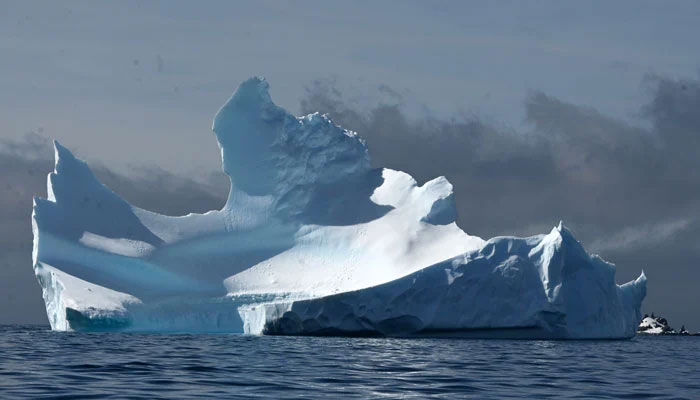Melting Antarctic could impact oceans ‘for centuries’
New modelling points to faster Antarctic ice melts driving a “substantial slowdown” of water circulation in the ocean depths
SYDNEY: Rapidly melting Antarctic ice threatens to dramatically slow deep-water currents in the world´s oceans, scientists say, impacting the spread of fresh water, oxygen and life-sustaining nutrients for centuries.
New modelling points to faster Antarctic ice melts driving a “substantial slowdown” of water circulation in the ocean depths if global carbon emissions remain high, researchers said in a study published in “Nature” on Wednesday.
The “overturning circulation” of waters in the deepest reaches of the oceans would slow by 40 percent by 2050 in a high-emissions scenario, according to the study, which warned of impacts that would last “for centuries to come”.
If the model holds, the deep ocean current will be “on a trajectory that looks headed towards collapse”, said University of New South Wales (UNSW) climate professor Matthew England, who coordinated the study.
Trillions of tonnes of cold, highly salty and oxygen-rich water sink around Antarctica each year, sending a deep-water current northwards to the Indian, Pacific and Atlantic oceans, scientists say.
The greater volumes of melting ice make the Antarctic waters less dense and salty, however, slowing the deep-water circulation with consequences for climate, sea level and marine ecosystems.
“If the oceans had lungs, this would be one of them,” England said. And if the oceans become stagnant below 4,000 metres, “this would trap nutrients in the deep ocean, reducing the nutrients available to support marine life near the ocean surface,” he added.
UNSW emeritus professor John Church, who was not involved in the study, said there were many uncertainties about the impact of declining deep ocean circulation. “But it seems almost certain that continuing on a high greenhouse gas emission pathway will lead to even more profound effects on the ocean and the climate system,” Church said. “The world urgently needs to drastically reduce our emissions to get off the high-emission pathway we are currently following.”
-
 Royal Family's Approach To Deal With Andrew Finally Revealed
Royal Family's Approach To Deal With Andrew Finally Revealed -
 Super Bowl Weekend Deals Blow To 'Melania' Documentary's Box Office
Super Bowl Weekend Deals Blow To 'Melania' Documentary's Box Office -
 Meghan Markle Shares Glitzy Clips From Fifteen Percent Pledge Gala
Meghan Markle Shares Glitzy Clips From Fifteen Percent Pledge Gala -
 Melissa Jon Hart Explains Rare Reason Behind Not Revisting Old Roles
Melissa Jon Hart Explains Rare Reason Behind Not Revisting Old Roles -
 Meghan Markle Eyeing On ‘Queen’ As Ultimate Goal
Meghan Markle Eyeing On ‘Queen’ As Ultimate Goal -
 Japan Elects Takaichi As First Woman Prime Minister After Sweeping Vote
Japan Elects Takaichi As First Woman Prime Minister After Sweeping Vote -
 Kate Middleton Insists She Would Never Undermine Queen Camilla
Kate Middleton Insists She Would Never Undermine Queen Camilla -
 King Charles 'terrified' Andrew's Scandal Will End His Reign
King Charles 'terrified' Andrew's Scandal Will End His Reign -
 Winter Olympics 2026: Lindsey Vonn’s Olympic Comeback Ends In Devastating Downhill Crash
Winter Olympics 2026: Lindsey Vonn’s Olympic Comeback Ends In Devastating Downhill Crash -
 Adrien Brody Opens Up About His Football Fandom Amid '2026 Super Bowl'
Adrien Brody Opens Up About His Football Fandom Amid '2026 Super Bowl' -
 Barbra Streisand's Obsession With Cloning Revealed
Barbra Streisand's Obsession With Cloning Revealed -
 What Did Olivia Colman Tell Her Husband About Her Gender?
What Did Olivia Colman Tell Her Husband About Her Gender? -
 'We Were Deceived': Noam Chomsky's Wife Regrets Epstein Association
'We Were Deceived': Noam Chomsky's Wife Regrets Epstein Association -
 Patriots' WAGs Slam Cardi B Amid Plans For Super Bowl Party: She Is 'attention-seeker'
Patriots' WAGs Slam Cardi B Amid Plans For Super Bowl Party: She Is 'attention-seeker' -
 Martha Stewart On Surviving Rigorous Times Amid Upcoming Memoir Release
Martha Stewart On Surviving Rigorous Times Amid Upcoming Memoir Release -
 Prince Harry Seen As Crucial To Monarchy’s Future Amid Andrew, Fergie Scandal
Prince Harry Seen As Crucial To Monarchy’s Future Amid Andrew, Fergie Scandal




